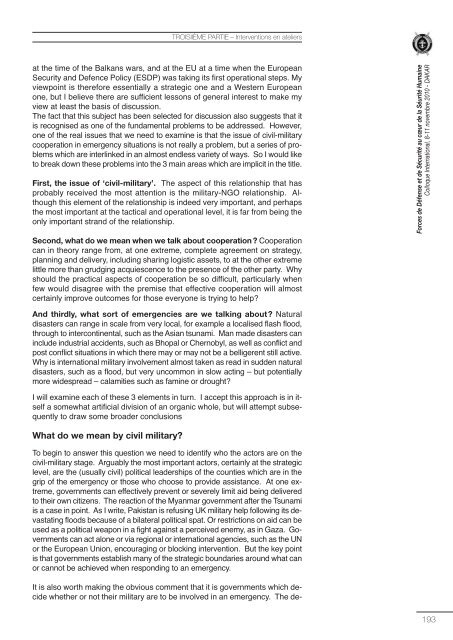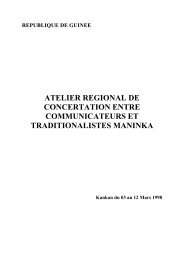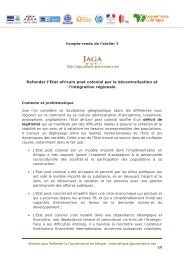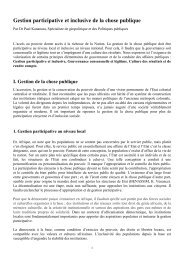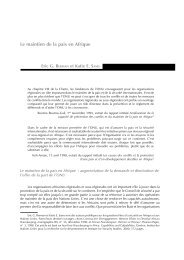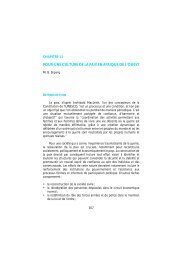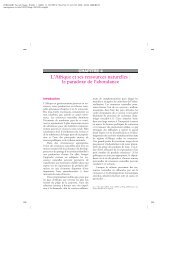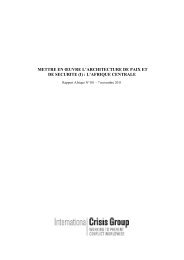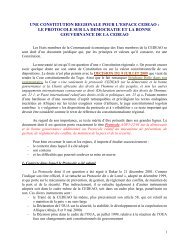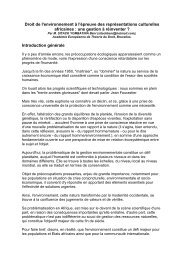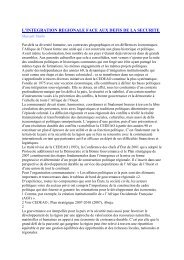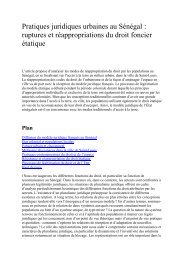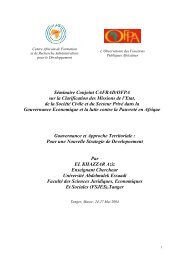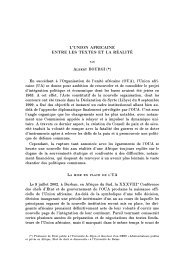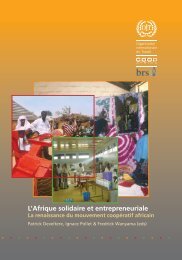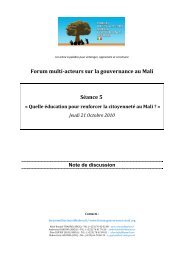Compendium - Fondation Charles Léopold Mayer pour le progrès ...
Compendium - Fondation Charles Léopold Mayer pour le progrès ...
Compendium - Fondation Charles Léopold Mayer pour le progrès ...
You also want an ePaper? Increase the reach of your titles
YUMPU automatically turns print PDFs into web optimized ePapers that Google loves.
TROISIIÈME PARTIE – Interventions en ateliersat the time of the Balkans wars, and at the EU at a time when the EuropeanSecurity and Defence Policy (ESDP) was taking its first operational steps. Myviewpoint is therefore essentially a strategic one and a Western Europeanone, but I believe there are sufficient <strong>le</strong>ssons of general interest to make myview at <strong>le</strong>ast the basis of discussion.The fact that this subject has been se<strong>le</strong>cted for discussion also suggests that itis recognised as one of the fundamental prob<strong>le</strong>ms to be addressed. However,one of the real issues that we need to examine is that the issue of civil-militarycooperation in emergency situations is not really a prob<strong>le</strong>m, but a series of prob<strong>le</strong>mswhich are interlinked in an almost end<strong>le</strong>ss variety of ways. So I would liketo break down these prob<strong>le</strong>ms into the 3 main areas which are implicit in the tit<strong>le</strong>.First, the issue of ‘civil-military’. The aspect of this relationship that hasprobably received the most attention is the military-NGO relationship. Althoughthis e<strong>le</strong>ment of the relationship is indeed very important, and perhapsthe most important at the tactical and operational <strong>le</strong>vel, it is far from being theonly important strand of the relationship.Second, what do we mean when we talk about cooperation?Cooperationcan in theory range from, at one extreme, comp<strong>le</strong>te agreement on strategy,planning and delivery, including sharing logistic assets, to at the other extremelitt<strong>le</strong> more than grudging acquiescence to the presence of the other party. Whyshould the practical aspects of cooperation be so difficult, particularly whenfew would disagree with the premise that effective cooperation will almostcertainly improve outcomes for those everyone is trying to help?Forces de Défense et de Sécurité au cœur de la Séurité HumaineColloque International, 8-11 novembre 2010 - DAKARAnd thirdly, what sort of emergencies are we talking about? Naturaldisasters can range in sca<strong>le</strong> from very local, for examp<strong>le</strong> a localised flash flood,through to intercontinental, such as the Asian tsunami. Man made disasters caninclude industrial accidents, such as Bhopal or Chernobyl, as well as conflict andpost conflict situations in which there may or may not be a belligerent still active.Why is international military involvement almost taken as read in sudden naturaldisasters, such as a flood, but very uncommon in slow acting – but potentiallymore widespread – calamities such as famine or drought?I will examine each of these 3 e<strong>le</strong>ments in turn. I accept this approach is in itselfa somewhat artificial division of an organic who<strong>le</strong>, but will attempt subsequentlyto draw some broader conclusionsWhat do we mean by civil military?To begin to answer this question we need to identify who the actors are on thecivil-military stage. Arguably the most important actors, certainly at the strategic<strong>le</strong>vel, are the (usually civil) political <strong>le</strong>aderships of the counties which are in thegrip of the emergency or those who choose to provide assistance. At one extreme,governments can effectively prevent or severely limit aid being deliveredto their own citizens. The reaction of the Myanmar government after the Tsunamiis a case in point. As I write, Pakistan is refusing UK military help following its devastatingfloods because of a bilateral political spat. Or restrictions on aid can beused as a political weapon in a fight against a perceived enemy, as in Gaza. Governmentscan act alone or via regional or international agencies, such as the UNor the European Union, encouraging or blocking intervention. But the key pointis that governments establish many of the strategic boundaries around what canor cannot be achieved when responding to an emergency.It is also worth making the obvious comment that it is governments which decidewhether or not their military are to be involved in an emergency. The de-193


